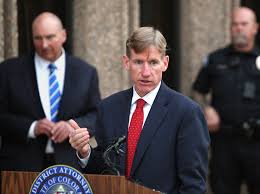City News
This is news from the city of Boulder, about the city or any of its departments

Aaron Stone running for Boulder City Council
Sep 29th
Boulder City Council Candidate Interview
Jann Scott interviews Aaron Stone, a candidate for Boulder City Council, to discuss his background and reasons for running. Stone, who has lived in Boulder since 2012, shares his experience and vision for the city. The interview is set to air on Boulder Channel 1.
Boulder’s Silence on Israel-Palestine Conflict
Aaron Stone, a computer engineer and Boulder resident, expressed concerns about the city’s increasing density and its investments in companies benefiting from the Israel-Palestine conflict. He highlighted that while 70% of Democrats and 20% of Republicans support stopping U.S. weapons shipments to Israel, Boulder City Council has been reluctant to address the issue, citing a policy of not commenting on foreign affairs. Stone criticized the council’s inaction, pointing out that they previously made statements against apartheid and the Iraq War, and questioned why they are not addressing the situation in Gaza, where over 100 human rights organizations have verified a genocide. He also discussed the impact of federal funding cuts on local programs and organizations, emphasizing the need for Boulder to uphold its values despite pressure from the federal administration.
Comparing Nazi Imagery to Pro-Israel Demonstrations
Aaron Stone expressed concerns about pro-Israel counter-protesters waving the Israeli flag, comparing it to Nazi imagery from 1938 Berlin. He noted that while both sides want hostages released and a free Palestine, the protesters’ actions are hurtful to many people. The discussion touched on the complex history of Hamas, which Aaron explained didn’t arise overnight and was supported by the Likud Party after Yitzhak Rabin’s assassination to counter the PLO’s two-state solution.
Balanced Approach to Homelessness Solutions
Aaron Stone discussed his concerns about homelessness in Boulder, highlighting the need for a balanced approach between housing and addiction treatment. He proposed creating a temporary, clean, and sober camping ground for the homeless, potentially on private land near Silver Saddle. Stone criticized the city’s recent decision to lower affordable housing requirements and pointed out the closure of two homeless shelters. He also noted the high cost of policing homelessness and suggested that funds could be better used for housing and treatment.
Aaron Stone’s Political Campaign Interview
Aaron Stone, a 49-year-old candidate, discussed his political campaign and media coverage, noting that he has been smeared in three national newspapers. He shared his website, aaronstone.org, for donations and contact. The interview concluded with Jann offering to include Aaron’s information for the television show and wishing him luck.

Rob Smoke is running for Boulder City Council
Sep 29th
Boulder Council Candidate’s Campaign
Rob, a long-time Boulder resident and former writer for the Daily Camera, is running for Boulder City Council for the fifth time. He has lived in Boulder since 1986 and previously ran for council in 2007. While he acknowledges the slim chance of winning this time, Rob expressed frustration with the repetitive nature of city council meetings and their focus on unnecessary data and political statements.
Boulder Council’s Silence on Gaza
Rob and Jann discussed the Boulder City Council’s stance on the conflict in Gaza, expressing frustration that the council has not condemned the violence or supported measures like divestment from companies aiding the conflict. Rob emphasized that morality and representing the core values of the community should be prioritized over political arguments, while Jann suggested that the council could pass a simple resolution condemning the genocide in Palestine. They criticized the council’s dismissive attitude and lack of action, highlighting the contrast with their past condemnation of international issues like apartheid in South Africa.
Boulder’s Homelessness Management Challenges
Jann and Rob discussed Boulder’s approach to homelessness, highlighting that the city spends approximately $4 million annually on police efforts to manage homeless individuals, with limited success. They noted that recent closures of the Tribe Home and youth housing facility have exacerbated the situation, while the city’s focus on law enforcement over treatment programs for addiction has proven ineffective. Rob suggested that using underutilized open spaces for designated camping areas could help reduce downtown homelessness, but the city’s resistance to such solutions reflects broader challenges in addressing the issue.
City Council Candidate’s Israel Policy Stance
Rob discussed his candidacy for City Council and expressed concerns about the city’s alignment with Trump administration policies, particularly regarding Gaza and Palestine. He questioned the need for Colorado’s Democratic senators and congresspeople to support Israeli weapons funding while ignoring the humanitarian crisis in Gaza.

Boulder Channel 1 News Briefs: Redford Trump D.A. Scott
Sep 17th
Boulder’s District Attorney is investigating social media algorithms on platforms like Facebook and Reddit, probing their role in radicalizing youth toward violence. The investigation follows the assassination of conservative campus speaker Charlie Kirk at Utah Valley University last week by suspect Tyler Robinson, deemed “terminally online.”
 Authorities linked Robinson’s radicalization to Discord and online echo chambers, recovering a high-powered rifle. The DA aims to subpoena platform data to trace influence paths, sparking debates on tech accountability. Over 30 educators were fired for celebratory posts. Community leaders urge Boulder youth to report toxic content, emphasizing digital literacy amid rising political tensions.
Authorities linked Robinson’s radicalization to Discord and online echo chambers, recovering a high-powered rifle. The DA aims to subpoena platform data to trace influence paths, sparking debates on tech accountability. Over 30 educators were fired for celebratory posts. Community leaders urge Boulder youth to report toxic content, emphasizing digital literacy amid rising political tensions. Local filmmaker Jann Scott revealed a heartfelt letter from the late Robert Redford, who died Tuesday at 89, praising Scott’s 1990s award-winning documentary about a Boulder homeless man.
 Redford called it a “quiet masterpiece” capturing humanity’s struggles.
Redford called it a “quiet masterpiece” capturing humanity’s struggles.  Scott said the note rekindled memories of Boulder’s compassionate spirit. “Bob saw the soul in the story,” Scott shared. The doc, highlighting life on Pearl Street, won regional acclaim. With Redford’s Boulder ties—from CU to Sundance—Scott plans screenings to honor him. Fans celebrate the Hollywood-local connection.
Scott said the note rekindled memories of Boulder’s compassionate spirit. “Bob saw the soul in the story,” Scott shared. The doc, highlighting life on Pearl Street, won regional acclaim. With Redford’s Boulder ties—from CU to Sundance—Scott plans screenings to honor him. Fans celebrate the Hollywood-local connection.  “Pure pageantry!” said Emma Hargrove, a CU lecturer. Boulder Channel 1’s editor, Jann Scott, a former International Times reporter in England, fondly recalls UK days. Despite London protests, Boulder Brits focus on diplomacy, hosting watch parties.
“Pure pageantry!” said Emma Hargrove, a CU lecturer. Boulder Channel 1’s editor, Jann Scott, a former International Times reporter in England, fondly recalls UK days. Despite London protests, Boulder Brits focus on diplomacy, hosting watch parties. 




















